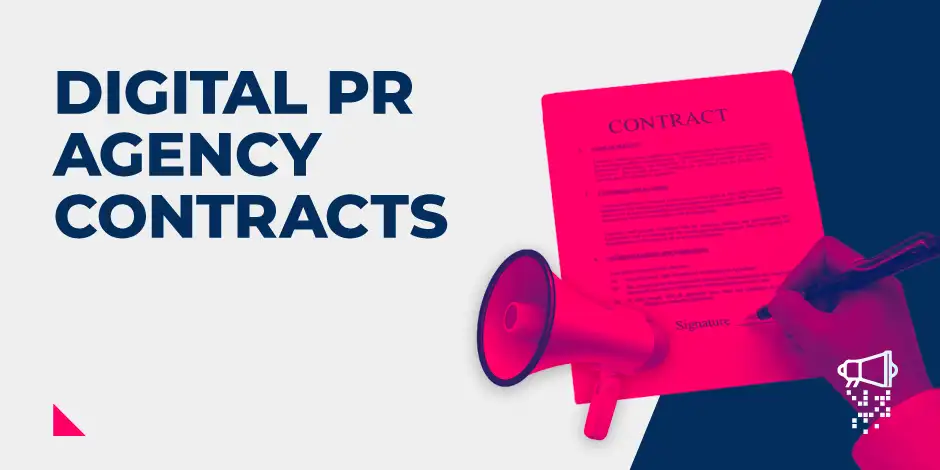
What to Expect From a Digital PR Contract
Digital PR can be a complicated field, but if you’ve made it to the part where you’re signing contracts then smooth sailing is in sight! You’ve navigated the muddled waters of traditional PR vs digital PR, you’ve decided against hiring an in-house digital PR team, and you compared digital PR consultants to an agency and think they probably aren’t what you need.
You also know what a digital PR agency is, know what the traits of a great digital PR agency are, and know how a digital PR agency can help your business.
You’ve narrowed down your choices and found the best possible digital PR agency to work with your brand. The next step is to sign the digital PR contract. This can be a nerve-wracking step, especially if this is your first time hiring a digital PR agency.
Contracts in any line of business can be confusing, but ones from some SEO firms and digital PR companies have their own set of baffling terms. Let’s run through what a digital PR contract is, what you can expect to find in a digital PR agency contract, and what it all means.
What is a Digital PR Contract?
A digital PR contract, like any other contract, is a formal and legally binding agreement between two or more parties. For digital PR, this means laying out the work expected, the time frame for completion, as well as the goals and targets.
It will also stipulate exactly what the client wants and how much they will pay for it—typically X amount per hour, with a Y-hour limit.
If the digital PR agency offers other services, those services can also be included if you discuss this with your agency contact. So if your digital PR agency also works as an SEO agency, your contract may include both services.
A contract will also cover any issues that can crop up along the way, with clearly defined requirements, statements of work and expectations within it.
 What to Expect in Your Digital PR Contract
What to Expect in Your Digital PR Contract
New contracts can be both exciting and intimidating. With so much jargon and legalese included in these contracts, however, you’ll need to make sure you understand what you’re agreeing to. Before you sign on the dotted line, here’s a rundown of the sections a digital PR contract will likely include and what they all means.
Firstly, the contract will clarify the terms by which each party is addressed. These are usually “The Client” (you) and “The Agency” or “Business Name” (the digital PR agency).
Then there will usually be subcategories named as follows:
Goal/Objective
This is the generalised goal of the work the digital PR agency will do. For example, “improve brand online reputation”, “increase traffic to client’s website through digital PR campaign backlinks”, and “look at competitors' sites to gain insight on where client’s site can be improved”.
It doesn’t specify the work it will take to get there but gives an overall idea of what the work will accomplish.
Read more: How to Review and Analyse a Digital PR Agency
Services / Scope of Work
This is where the work the digital PR company will do for you is outlined.
It can be in the form of a list, including items such as “gaining X amount of links per quarter to the client website’s inner pages” or “creating Y number of digital PR campaigns per quarter” (sometimes both!).
This is where all the specifics of the work will go and the key performance indicators (KPIs) will be listed.
Mitigating Factors
The agency will give examples of what they will do in the case of mitigating factors. For instance, if the agency has a recommendation that will work in line with the goals laid out, or they notice an issue acting against them, they will advise the client of this and what it will cost to resolve. No extra work will be done until the client has given their approval.
For example, this could be the client’s website speed being too slow which impacts bounce rates. The agency will advise and likely offer a remedy to this, which the client can choose to go along with, or not. If the client decides not to resolve this issue, it can be a mitigating factor in the KPIs.
“Terms and Termination” or “Contract Period and Payment”
This will simply lay out the start date of the work and for how many months the work will be ongoing. For example “Work will commence on 15th August 2021 and continue for six months, up to and including 15th February 2022.”
It could also be that the agency works on a retainer, in which case it will read something like “work will commence on 15th August on a rolling basis and will be terminated as per cancellation agreement”.
This section can also include payment—the amount and when it will be paid. You should already have some idea from previous discussions about how much a digital PR agency costs, but this is where it will be clarified totally. For example, “The Client agrees to pay the agreed upon amount via BACS, or direct transfer, or X by the 7th of the month”.
Materials and/or Information
This section ensures that any materials (such as photos, graphics, or copy) or information (like data) that the agency needs is provided by the client in good time. The materials and information will also have to be useable and legible—a blurry photograph of some handwriting, or a badly cropped graphic won’t do.
Account Management and Communications
This section, sometimes split into two sections, covers the updates the agency will provide on how the work is going and how often this will take place. It will also establish a set routine where both parties make sure they are available for a call or meeting to discuss the ongoing work.
Any meetings requested outside of the established schedule may incur further fees.
This section will also stipulate how and where to get in touch with the agency, for example, if their client hours are from 9 am to 5 pm, they can only be reached during that time.
Cancellation
Sometimes, it just doesn’t work out. And that’s okay. Having a cancellation clause in a contract doesn’t mean either party is expecting to back out, it just covers everyone should the worst happen.
Cancellation clauses can include fees for either party, stipulated minimums for the work, or agreed dates on a rolling basis. Each cancellation clause will be unique to the client’s needs and wants.
Confidentiality and Non-Disclosure Agreements
Every client has the right to confidentiality and this is the part that cements that in writing. However, most agencies will have an allowance so they can use the work they're doing with a client in a case study.
Case studies are nothing to be alarmed about—they're a chance for an agency to show off the wonderful results they’ve achieved for you, and can easily be written without any identifying information included.
Amendments/Modification
This is a simple clause regarding what will happen if either party wants to change the agreement and how this subject should be approached. Typically, it stipulates that no changes can be implemented until both parties are in agreement.
Ownership Changes
Sometimes businesses change hands, such is the nature of commerce. Typically, the contract will stipulate that the terms will be handed over to the new owners and work will continue for a set amount of time. After this, new contracts can be created for the continuation of work with the new business owners.
Why Sign with Reboot Online Digital PR Agency
Here at Reboot Online, we eat, sleep, and breathe digital PR campaigns. Our spritely team is constantly working to bring fresh ideas and new angles to the table. Whatever industry you’re in, we have the expertise to craft unique campaigns that journalists adore.
If you’re ready to take the plunge, just want to ask some questions about signing the dotted line, or already have a list of questions to ask a digital PR agency—don’t hesitate to reach out via our contact page.
